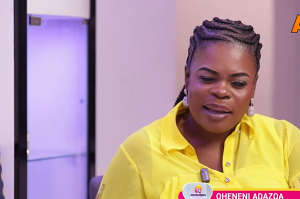Former Ghana National Petroleum Corporation (GNPC) boss, Mr Tsatsu Tsikata, has given a different account of events leading to the sale of the drillship, Discoverer 511, by the Kufuor government to defray a US$19.5 million judgment debt owed Societe Generale, some twelve years ago.
He suggested that Albert Kan-Dapaah and Kwabena Tahir Hammond rushed in disposing off the national asset, instead of ensuring due diligence on the claims by the French bank.
Tsatsu Tsikata, also denied charges leveled against him by Mr Kan-Dapaah and Mr Hammond, who served as Minister and Deputy Energy Minister respectively, in the Kufuor administration, as the ones who caused Ghana to lose its drillship, now nicknamed, Noble Discoverer by Dutch Shell from Frontier Discoverer by the Norwegians.
The ex-GNPC boss, revealed that prior to the sale of the drillship, Societe Generale had lost two law suits filed against GNPC and suggested that the French company was on its way, to lose for the third time in a case it had filed in a UK High Court when the Kufuor government, hurriedly sold the drillship to settle the debt, after failing to send lawyers to fight the case brought against Ghana.
Mr. Tsikata made denials, as well as revelations as far back as 2001 at a press conference, following an earlier one held on August 8, 2001, by Mr. Kan-Dapaah in which he leveled several allegations against Mr. Tsikata.
Prior to Mr. Kan-Dapaah’s press conference, a Government Spokesperson on July 27, 2001, had earlier issued a statement to the effect that, the Discoverer 511 had been sold to pay for losses incurred by Mr. Tsikata in derivative transactions with Societe Generale, a bank Headquartered in Paris, which had obtained a judgment against GNPC in the total sum of US$47 million.
According to Mr. Tsikata, “before Societe Generale brought their claim in the London High Court, they had earlier in 1998 filed a suit in the United States in the District Court in Houston - seeking an order to have the GNPC drillship, D511, moved to the US and detained by them upon conclusion of its contract in Mexico”.
“This suit was brought against the US Company that had chartered the drillship, as well as GNPC. The case of Societe Generale was thrown out and when they appealed to the Court of Appeal in New Orleans, they were again unsuccessful. It emerged in those proceedings that Societe Generale had sought legal advice about taking action in Mexico, where the drillship was operating, or in Panama where the drillship was registered, and they realised that they could not succeed in either jurisdiction if they filed a suit”, the ex-GNPC boss revealed.
According to him, “affidavits had been filed in support, including one by me. Subsequently, GNPC was instructed by Government to notify the Solicitors that the case would no longer be handled by them, but by the Attorney General’s Department in Ghana”.
Though GNPC had some payment arrears in respect of the Solicitor’s fees, efforts were being made to settle these and the Solicitors continued to represent the Corporation’s interest until they received instructions to stop and hand over to the Attorney- General then led by Nana Akufo- Addo.
“The Solicitors for GNPC, therefore, obtained permission from the Court to withdraw from acting for the Corporation. The important applications they had made to the court were therefore not pursued. Obviously taking advantage of this situation, Societe Generale applied to the Court to make certain amendments to their case and then, thereafter, applied for judgment against GNPC. There was no representation by or on behalf of GNPC, and judgment was entered against the Corporation”.
He denied Mr. Kan-Dapaah’s claim that he (Tsikata) presented himself to Societe Generale, as “a commercial, legally trained businessman, sophisticated in terms of his understanding of derivatives trading and the theory,” as untrue.
Mr Tsikata explained that Societe Generale rather presented itself to him in his capacity as Chief Executive of GNPC as being able to assist the Corporation with financing for its various activities, particularly the Tano Fields development, which he had indicated to them was then Ghana's priority, after which they were invited to make presentations to other staff of GNPC.
“I did not inform them that GNPC traded in derivatives and was keen to transact business with them. Societe Generale’s expertise in relation to derivatives was one of their selling points and they provided relevant corporate information to back this”, he insisted.
“There were also ready credit lines for these transactions to be undertaken, expressly in relation to the Tano fields development and not in relation to the sale of oil on the international market. Societe Generale made it clear that financing of the sort required by GNPC would require undertaking derivatives transactions to ensure that future oil price movements do not adversely affect the ability of the Corporation to repay debts incurred on the project”.
“From the onset, I emphasised to them the need for their technical assistance in enabling GNPC achieve the objective of managing the risks involved. I specifically made requests for the training of GNPC personnel involved in these transactions and asked Societe Generale to make relevant software tools for assessing and managing the positions GNPC held”.
Societe Generale, he said “agreed to provide this help and actually trained some GNPC personnel and assisted with software and other material. Ladies and gentlemen, how then can a person who made such requests that were acceded to by Societe Generale be accused of presenting himself to Societe General as being sophisticated in terms of understanding of derivatives trading and the theory behind how derivatives work?
Mr. Tsikata noted that Mr. Kan- Dapaah “chooses to quote copiously from Societe Generale’s self-serving statements without giving the public the benefit of knowing that these were disputed and that there was testimony in the court proceedings which contradicted these statements of Societe Generale.
“The basic strategy for the derivative transactions was recommended by Societe Generale and they provided the credit lines for the transactions and controlled what transactions were acceptable throughout the period. At various points, they expressed satisfaction with our compliance with their recommended strategy by increasing their credit to GNPC to continue these transactions.
“When there were delays in respect of project implementation, they were notified but that did not prevent them from giving increased credit for the transactions. It was not on the basis of any claim to infallibility about oil prices that these transactions were entered into. Rather, recognising my own fallibility and limitations as well as those of the Corporation I was heading, I sought help and guidance from Societe Generale”, the ex- GNPC boss further disclosed.
General News of Friday, 20 September 2013
Source: The Herald













